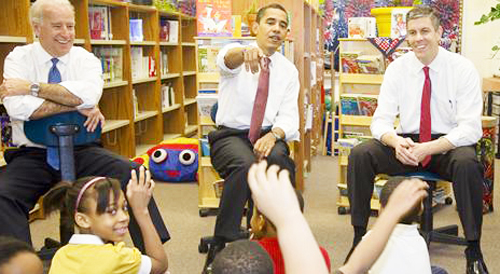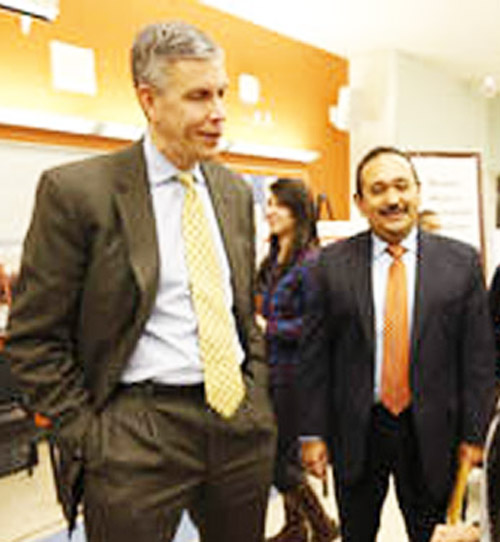Obama administration's attacks on public education escalate while country's attention is facing in other directions... Arne's new college rules to create 'perverse incentives'
 Six years ago, in December 2008, the vice president- and president-elect of the United States came to Chicago to promote the newly appointed U.S. Secretary of Education Arne Duncan. Duncan had served as "Chief Executive Officer" of Chicago's public schools beginning in July 2001, and had initiated many of the neoliberal privatization practices that later became national policy. Above, Joe Biden, Barack Obama, and Arne Duncan did a publicity stunt at the "Dodge Renaissance Academy School of Excellence" on Chicago's West Side a month before the inauguration. Not noted in 2014 is the fact that Obama's former Chief of Staff, Rahm Emanuel, had Dodge closed during his rampage of school closings. The Dodge building has now been "repurposed" to hold dozens of Chicago Public Schools bureaucrats. Following his decades' long crusade against the nation's real public schools, U.S. Secretary of Education Arne Duncan wished a "Happy Thanksgiving" to the nation's colleges by issuing federal guidelines that he claims will improve the "quality" of the nation's teacher training. Relying on the same "metrics" that have bedeviled the nation's real public schools (but which are never utilized against charters or wealthy private schools), the former "Chief Executive Officer" of Chicago's public schools increased the neoliberal pressure towards privatization that has been coming from the Obama administration since Duncan was appointed to the post in January 2009.
Six years ago, in December 2008, the vice president- and president-elect of the United States came to Chicago to promote the newly appointed U.S. Secretary of Education Arne Duncan. Duncan had served as "Chief Executive Officer" of Chicago's public schools beginning in July 2001, and had initiated many of the neoliberal privatization practices that later became national policy. Above, Joe Biden, Barack Obama, and Arne Duncan did a publicity stunt at the "Dodge Renaissance Academy School of Excellence" on Chicago's West Side a month before the inauguration. Not noted in 2014 is the fact that Obama's former Chief of Staff, Rahm Emanuel, had Dodge closed during his rampage of school closings. The Dodge building has now been "repurposed" to hold dozens of Chicago Public Schools bureaucrats. Following his decades' long crusade against the nation's real public schools, U.S. Secretary of Education Arne Duncan wished a "Happy Thanksgiving" to the nation's colleges by issuing federal guidelines that he claims will improve the "quality" of the nation's teacher training. Relying on the same "metrics" that have bedeviled the nation's real public schools (but which are never utilized against charters or wealthy private schools), the former "Chief Executive Officer" of Chicago's public schools increased the neoliberal pressure towards privatization that has been coming from the Obama administration since Duncan was appointed to the post in January 2009.
In the process of establishing the so-called "metrics" to treat colleges of education the same way the administration has been treating the nation's real public schools, the administration ignores the failure of the policies as they have been applied to Pre-K to 12. As noted in the New York Times article, one of the most serious results of the fetishization of high-stakes tests and a handful of other so-called "metrics" has been the "perverse incentives" that lead to routine cheating. In fact, at one of Arne Duncan's 2014 visits to Chicago, a school that had cheated massively on other "metrics" (viz., attendance), Juarez High School, was honored by the national administration.
An additional irony to the announcement about the colleges of education is that for more than a generation most colleges and college professors have joined in the teacher bashing aimed at the nation's real public schools, not only by the Obama administration, but by the Bush and Clinton administrations before Barack Obama became president. Few today remember that President Bill Clinton praised Chicago's "school reform" Board of Trustees (that's what it was called following the Amendatory Act of 1995) as a model for the USA. Until Clinton learned that most of the claims made by then CPS CEO Paul G. Vallas were lies. By June 2001 Vallas was forced out of office by then Chicago Mayor Richard M. Daley, and an equally unqualified amateur, Arne Duncan, raplaced him.
THE NEW YORK TIMES REPORTED THE STORY ON NOVEMBER 26, 2014 (Chicago news outlets so far have ignored this important story):
By MOTOKO RICHNOV. 25, 2014
 U.S. Secretary of Education Arne Duncan visited Chicago's Benito Juarez High School in 2014 because the school has supposedly created a miraculous turnaround in attendance. The turnaround proved to be a fraud, but the Board of Education covered it up, and the principal was allowed to get rid of the teacher, a union delegate, who had helped blow the whistle. The federal Department of Education announced preliminary rules on Tuesday requiring states to develop rating systems for teacher preparation programs that would track a range of measures, including the job placement and retention rates of graduates and the academic performance of their students.
U.S. Secretary of Education Arne Duncan visited Chicago's Benito Juarez High School in 2014 because the school has supposedly created a miraculous turnaround in attendance. The turnaround proved to be a fraud, but the Board of Education covered it up, and the principal was allowed to get rid of the teacher, a union delegate, who had helped blow the whistle. The federal Department of Education announced preliminary rules on Tuesday requiring states to develop rating systems for teacher preparation programs that would track a range of measures, including the job placement and retention rates of graduates and the academic performance of their students.
In a move that drew some criticism, the Education Department said the new rating systems could be used to determine eligibility for certain federal grants used by teacher candidates to help pay for their training.
Critics have long faulted teacher training as inadequately preparing candidates for the realities and rigors of the job.
In a conference call with reporters, Arne Duncan, the secretary of education, said that far too many education programs set lower requirements for entry than other university majors.
�The last thing they want or need is an easy A,� Mr. Duncan said. �This is nothing short of a moral issue. All educators want to do a great job for their students, but too often they struggle at the beginning of their careers and have to figure out too much on the job by themselves.�
The proposed rules will be subject to public comment for 60 days. If they are adopted, states will be given a year to develop the rating systems, with alternative programs like Teach for America also subject to the rules.
The most contested of the rules is one calling for teacher training programs to track the performance of students taught by their graduates. Although the rules do not require tests, 42 states, the District of Columbia and Puerto Rico have agreed with the Department of Education to develop teacher performance ratings that include test scores.
Critics, including teachers� unions, say such measures are unreliable and difficult to link to the quality of training.
Mr. Duncan said states should ensure that teacher training programs and their graduates are rated on a range of measures, not just the scores of their students.
Sharon Robinson, president and chief executive officer of the American Association of Colleges for Teacher Education, warned against linking eligibility for the federal grants � about $100 million�s worth per year, given to prospective teachers who are planning to work in high-need schools � in part because of the precedent it could set. �The next question might be Pell grants,� Ms. Robinson said, referring to federal tuition aid for low- and middle-income college students.
Education experts said the new regulations were necessary to spur change, particularly among colleges that draw most of their tuition revenue from candidates enrolled in education programs.
�I think you need to wake up the university presidents to the fact that schools of education can�t be A.T.M.s for the rest of the college or university,� said Charles Barone, policy director for Democrats for Education Reform, a group that pushes for test-based teacher evaluations and has battled teachers� unions.
Using metrics like job placement makes common sense, said Arthur Levine, president of the Woodrow Wilson National Fellowship Foundation, which administers a program for people training to be high school teachers, because it would force programs to train people for actual job openings.
�Education schools and universities educate a lot of elementary school teachers, an area that�s glutted,� Mr. Levine said. �On the other hand, we definitely need science and math teachers, which they don�t prepare.�
Policy experts warned that requiring certain metrics could skew behavior in unintended ways. Under the No Child Left Behind law, some schools engaged in test cheating to meet requirements that students score at levels deemed proficient on reading and math tests. �It�s all too easy to create perverse incentives,� said James E. Ryan, dean of the Harvard Graduate School of Education.
A version of this article appears in print on November 26, 2014, on page A14 of the New York edition with the headline: U.S. Wants Teacher Training Programs to Track How Graduates� Students Perform. Order Reprints| Today's Paper|Subscribe

